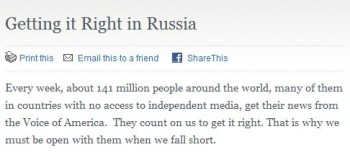
Voice of America apologized for running a fake interview. (Credit: Inside VOA, screenshot)
Voice of America apologized Feb. 2 for running a fake interview with “well-known Russian opposition blogger Alexi Navalny,” according to a note from Voice of America director David Ensor. The Voice of Russia reported that “two years ago, Navalny became widely popular across the Russian blogosphere as a vehement anti-corruption campaigner.”
The apology was prompted by a tweet from Navalny that the interview was phony. Navalny’s tweets included “Voice of America has gone completely nuts. [They] have published a huge fake ‘Interview with Navalny.'”
Ria Novosti noted that the fake interview, titled “If you want to do something well, do it yourself,” was published Jan. 31.
We wrote to Voice of America asking more information about this incident. Kyle King from Voice of America’s public relations, told iMediaEthics by e-mail that Voice of America hasn’t learned “who was behind” the phony Navalny interview. King explained that the phony interview was via e-mail after a Voice of America reporter saw “comments that appeared to be from him on Futurba,” a Russian “microblogging” site. The reporter contacted that person, who gave an e-mail and then an e-mail interview posing as Navalny.
According to the apology, Voice of America said it “will strengthen our editorial standards and enact additional safeguards.” We asked King what that means. He told us that moving forward, Voice of America plans to use “face to face recognition or a recognizable voice to authenticate this kind of interview.” Also, ” we have added extra training in social media sourcing and verification, and all enterprise reporting like this will require a second editor to approve the material,” King told iMediaEthics by e-mail.
We asked King if Voice of America had any further comment concerning this incident. He wrote:
“Yes, doing business in Russia is tough. We live in a digital age where identities are faked and websites hacked. By summer 2008, pressure from the Putin administration had forced VOA programs off the Russian radio and television stations that once carried them. Since then our Russian service has created a vibrant and dynamic website to reach out to this important audience, and we intend to keep offering accurate, balanced and comprehensive coverage that is not available from state controlled media.”
Doctored Photo of Navalny Also circulated
In Voice of America report on the incident, Voice of America noted that Navalny was shown in a doctored photo “standing next to an exiled Russian financier who is wanted by police.” The photo was exposed as doctored “when the original was produced by the photographer.”
That fake photo, shown here with the original and some parodies, carried the caption “Alexei Navalny has never hidden that Boris Berezovsky gives him money for the struggle with Putin,” according to the Guardian. The fake photo was published in “a paper in the city of Yekaterinburg,” the BBC noted.
The real photo pictured Navalny with “Mikhail Prokhorov, a billionaire who owns the New Jersey Nets basketball team and is also running for the Russian presidency,” according to the Guardian. The New York Times explained that the real photo’s photographer “posted the original photograph and a series of shots just before and after, helping to establish their authenticity.”
According to NPR, Voice of America suggested Navalny was satisfied with the apology.
UPDATE: 2/23/2012 11:10 AM EST: Updated with information from Voice of America






Comments Terms and Conditions